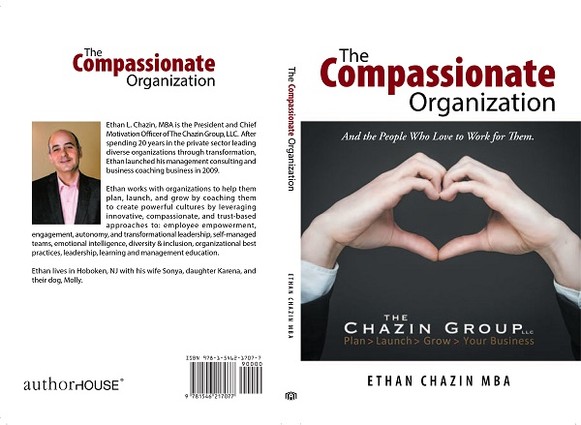Interview with Ethan Chazin, Author of “The Compassionate Organization”

Ethan Chazin has been helping members of the New Jersey tech ecosystem since he began his consulting practice in 2009. He is a frequent attendee of the NJ Tech Meetup. As a past contributor to NJTechWeekly.com, he has written convincingly about the need to bring innovation to organizations. With his latest book, he addresses the problem of how companies can attract and keep talent by becoming “compassionate organizations.”
Name of the book: “The Compassionate Organization: And the People Who Love to Work for Them.
Author: Ethan Chazin, MBA
Tell me about your background.
After spending 20-plus years in corporate America, I launched my business-coaching and organizational-behavior consulting practice. My first book was “Bulletproof Your Career in Turbulent Times,” and I have spoken to 15,000 job seekers about today’s workforce, the job market and the changing role of the organization in the employee-employer contract.
I have taught at 10 New York and New Jersey colleges and universities; spoken to students at over 50 academic institutions; and coached or consulted with more than 250 for-profit, nonprofit and government organizational clients.
How did you get the idea for this book?
The idea came about from my 20-plus years of working inside organizations that struggled to create cultures that were appealing to employees of any generation, but in particular, millennials, who now comprise the largest segment of the American workforce.
In the past, employees went to work for organizations with an implicit agreement that they would provide their skills for fair pay. If they performed well, they would be rewarded with a modicum of job security and perhaps career advancement. Those days of one employer per career are long gone. In today’s “contract” economy, workers change jobs between eight to ten times by the time they reach 35 years of age. Mature workers and Baby Boomers are leaving the workplace by the tens of thousands every day.
This mass exodus of the mature workforce and Baby Boomers coincides with millennial workers taking over roles of increasing importance within organizations. Estimates are that millennials will constitute 75-80 percent of the American workforce by 2020. Meanwhile, organizations have been “flattening out” their management ranks as they cast off layers of middle management in the past few decades.
With this huge transfer in the balance of power from older to younger American workers, millennials bring with them into the workplace a new set of organizational values, beliefs about work and a set of ethics and expectations about appropriate organizational behavior. Millennials expect that the organizations they work for (and buy from) share their values, possess a moral compass and care for the environment.
Organizations that understand this have begun to embrace ethics and values as part of their cultures, thus the need for a 21st-century “compassionate organization.”
Why are you the right person to write this book?
During my time in corporate America, despite the leadership roles that I often took in the organizations that I dedicated myself to serving, I was downsized, rightsized and outsourced eight times (never due to performance) in my 20s, 30s and 40s.
This happened despite achieving a consistent track record of significant success within these organizations that I committed to. I learned first-hand what it felt like to be deemed “dispensable” despite those accomplishments.
After being laid off from the management team of Time Warner Cable in 2008, I decided that enough was enough.
I launched my organizational-training and business-coaching firm in 2009 with the sole express purpose (a “calling,” actually) of teaching as many organizations as I could how to create powerful cultures focused on employee engagement and unleash their employees’ untapped potential.
How did you go about gathering material for this book?
Nearly ALL of the material that I sourced came directly from the teaching, coaching and employee training that I have conducted. I always strive to apply the experiences that I’ve gained while working in the private sector and then in my consulting practice.
All the material that I present in “The Compassionate Organization” focuses on the most successful, best practices that world-class organizations are implementing to achieve a lasting competitive advantage. I do not bother with esoteric theory. There is, in fact, no “war on talent.” There is simply an ongoing battle that organizations face when setting themselves apart by caring for their people.
What is the audience you hope to reach with this book?
The focus of this book on people who lead or work in development roles, tasked with obtaining direct customer feedback and building products or offering services that exceed their clients’ wildest expectations. This entails topics pertaining to being emotionally intelligent, and to leveraging innovation, critical thinking and problem-solving skills that demand employees who are engaged, empowered, rewarded, coached and motivated by the compassionate organizations that care enough to build a bold new culture led by transformational leaders.
Please give the readers three takeaways from the book.
1. Ethical organizations outperform (in every industry and every country market) their morally compromised competitors, according to decade-long research conducted by Ethisphere.
2. Nearly all of your assumptions about millennial workers are wrong.
3. Managing ‘ain’t leading. No organization ever successfully transformed from good to great through management. Nothing short of “transformational” leadership will help you navigate your world-class organizations through these challenging times.
4. BONUS tip ? The 4P model of successful leadership in compassionate organizations demands you focus on: 1) your People; 2) the Planet; 3) a Purpose, and 4) Probity, or having a moral compass.
Please provide two lessons readers will learn from the book.
1. Employee empowerment is the future of our 21st-century workforce dynamic, and NOT just a buzzword.
2. Start by hiring superhero employees, and do everything you can to make sure they grow with you, engage with you and stay with you.

